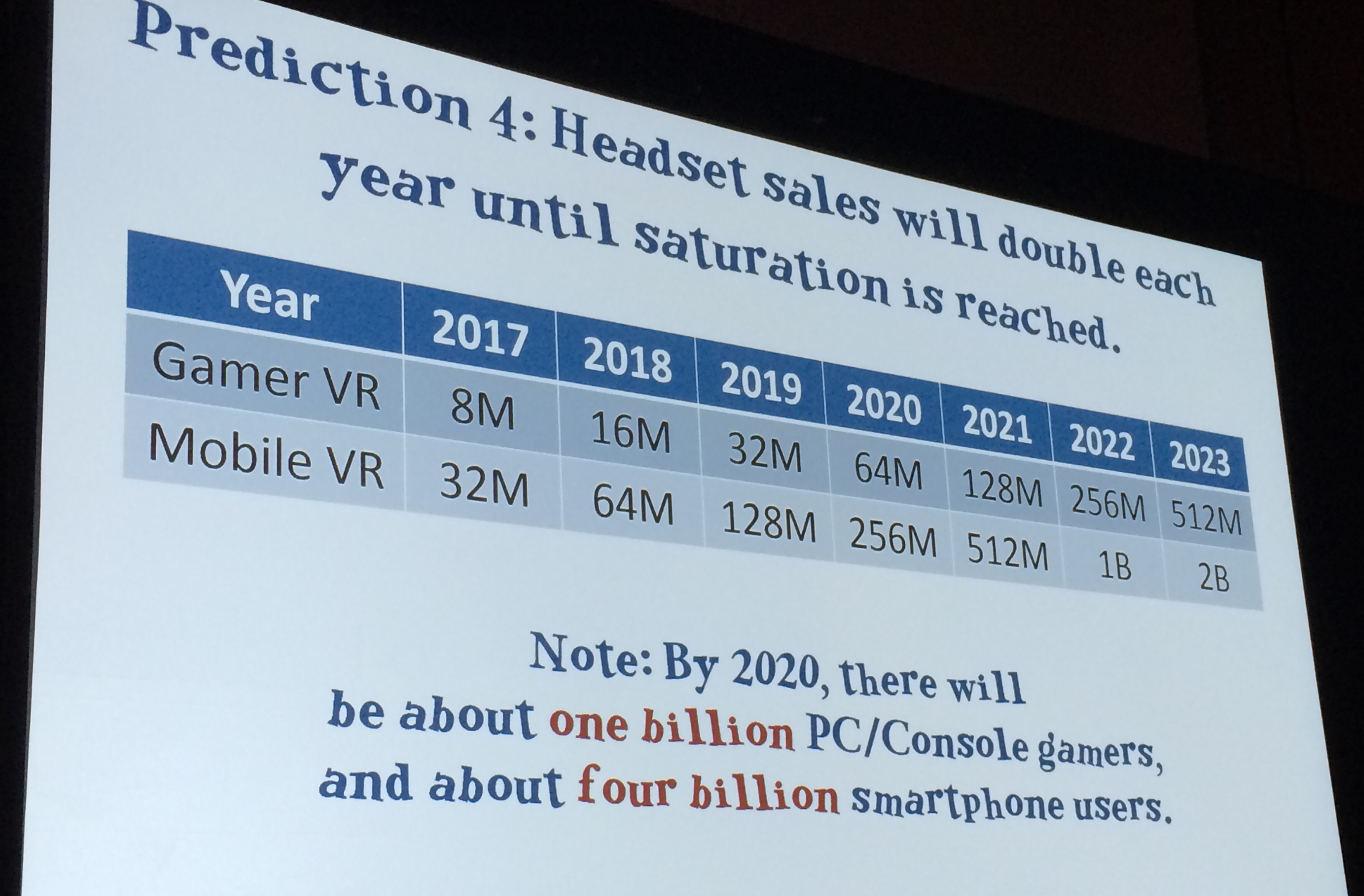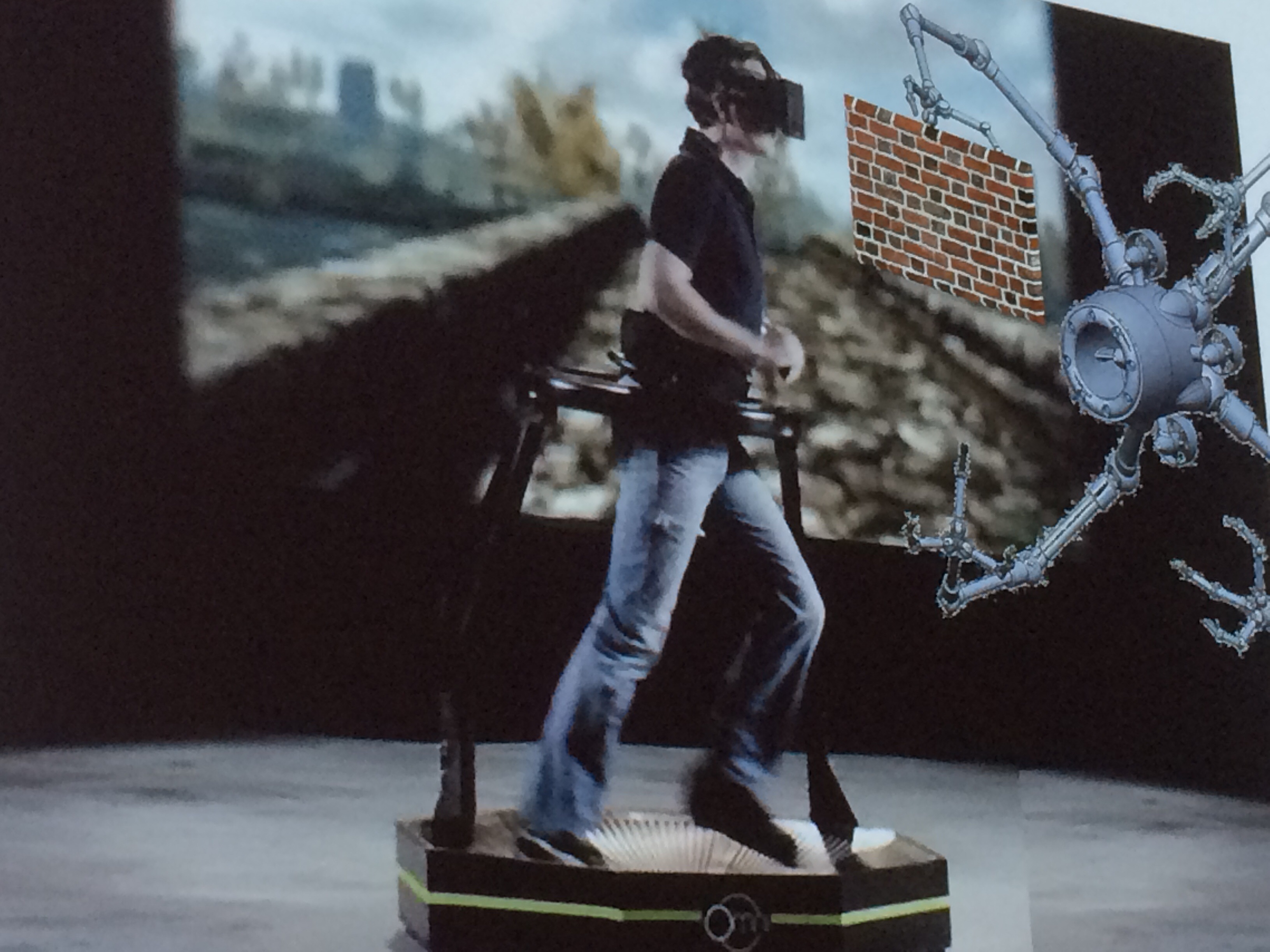By 2025, robots will touch you in VR, and other bold predictions

If, when, and how virtual reality will become a mainstream platform are all open questions for most of us. Our team is collectively excited about the possibilities of VR and the experiences it's giving us access to in this primordial period, but the immediate challenges seem big: it's expensive, it takes high-end hardware to have the best experience, and it's risky for developers to go all-in and spend millions of dollars building the VR equivalent of Fallout or Call of Duty until there's wide adoption.
But good news: there will be 8 million Vives, Oculus Rifts, or PlayStation VR headsets sold this year, and "starting in 2016, VR headsets will be in the consumer market permanently. They're not going to go away." VR developer and Schell Games CEO Jesse Schell made this and many more bold prophecies about the future of VR in a talk titled "40 Predictions for VR/AR through 2025" at GDC 2016 today. It was a packed session: many of the attendees likely caught Schell's terrific DICE 2010 talk in which he shared equally bold thoughts about the future of gaming and Facebook on the way to painting a picture of extrinsic reward systems connected to everyday tasks.

Here's how Schell's VR sales math adds up. By the end of 2016, Sony will have sold 40 million PlayStation 4's worldwide. "If they can't sell them to 10 percent of that audience, are you kidding me? So 10 percent, that's four million right there. Oculus, those guys have sold 300,000 dev kits. If you can't sell 10 units for every dev kit that you sold, what are you doing," says Schell. Add in 1 million HTC Vives (a guess, Schell admits), and you've got 8 million sold by the end of the year, not including mobile VR devices.
VR and Mister Handy
Maybe the boldest prediction from Schell's talk was the last one he shared: a vision of gamers using robots to augment our VR experiences with touch. Schell gave a vision of a robot standing invisibly in front of our VR headset, acting like a VR propmaster to place physical textures in front of us—like a dungeon wall or a wooden door that you can knock on. Because these robots will be able to track the state of the game world and where our head and hands are positioned, Schell says, they'll be able to anticipate our movements and meet us in mid-air, or even physically hand us weapons or other props as we find their in-game equivalents. Schell played a video of 'JediBot,' a Stanford robotics project, to demonstrate the cross-application of touch and VR.

"This is totally, totally going to be a thing. By 2025, robots will touch you in VR, and you'll like it," says Schell. "Touch is incredibly primal. We've been touching things on planet Earth for 200 million years. That's how old touch is, that's how old it is in your brain. We want to touch stuff in VR, so how is that gonna happen?" Schell cited Skylanders and Rock Band as examples of touchable things giving meaning to digital experiences and helping to move product, predicting that by 2020, trackable props for VR and AR are going to be common. "Partly because it's just a cool thing to do, but partly because it's just a good business model."
Whatever trends emerge from VR, Schell, whose studio is at work on Orion Trail as well as VR games Water Bears and I Expect You To Die, is confident that "This isn't some fad. This isn't the Kinect or the Super Scope 6. It's going to stay."
A timeline of some of Schell's most interesting predictions:
The biggest gaming news, reviews and hardware deals
Keep up to date with the most important stories and the best deals, as picked by the PC Gamer team.
- By the end of 2017, the media will blame at least one mass shooting on a VR game.
- An asymmetric party game will be a top ten VR game by the end of 2017.
- By the end of 2017 news stories about 'VR addiction' will be frequent.
- Madden will have a VR edition by 2018 ("Because why wouldn't they?" Schell says).
- VR documentaries will be the first to win awards.
- By the end of 2020 at least one VR MMO will have 1M subscribers. (Free-to-play doesn't work well in VR—It interrupts your experience, it's presence-breaking, Schell says).
- By 2025, VR/AR boardgames will be a $100M business.
- By 2025 there will be no more corded VR systems.

Evan's a hardcore FPS enthusiast who joined PC Gamer in 2008. After an era spent publishing reviews, news, and cover features, he now oversees editorial operations for PC Gamer worldwide, including setting policy, training, and editing stories written by the wider team. His most-played FPSes are CS:GO, Team Fortress 2, Team Fortress Classic, Rainbow Six Siege, and Arma 2. His first multiplayer FPS was Quake 2, played on serial LAN in his uncle's basement, the ideal conditions for instilling a lifelong fondness for fragging. Evan also leads production of the PC Gaming Show, the annual E3 showcase event dedicated to PC gaming.

